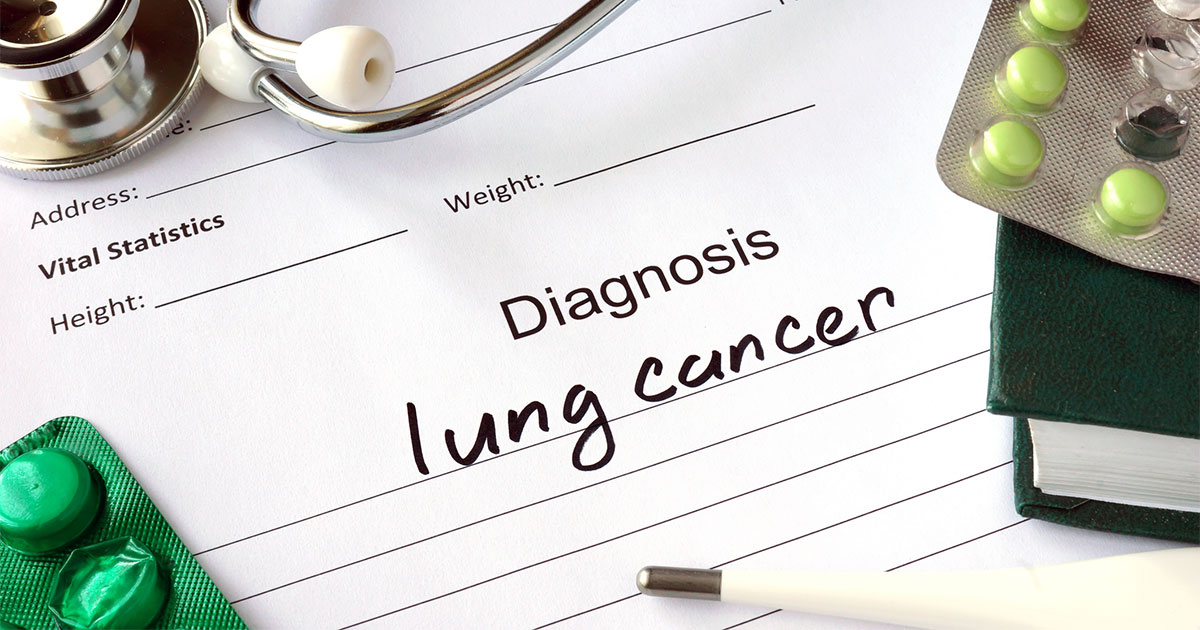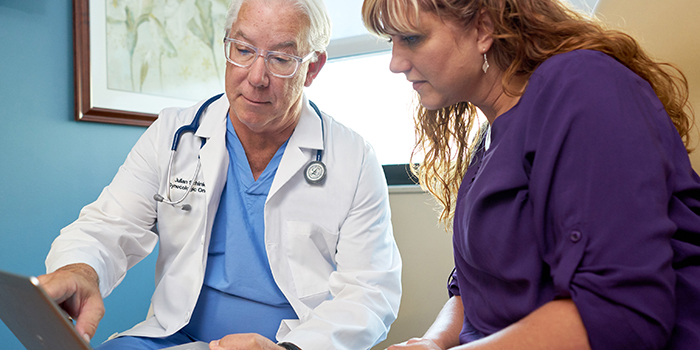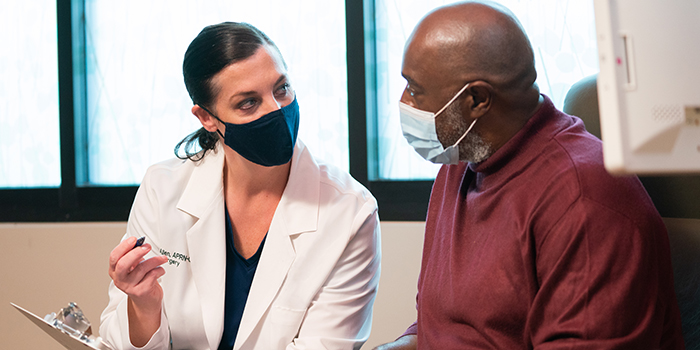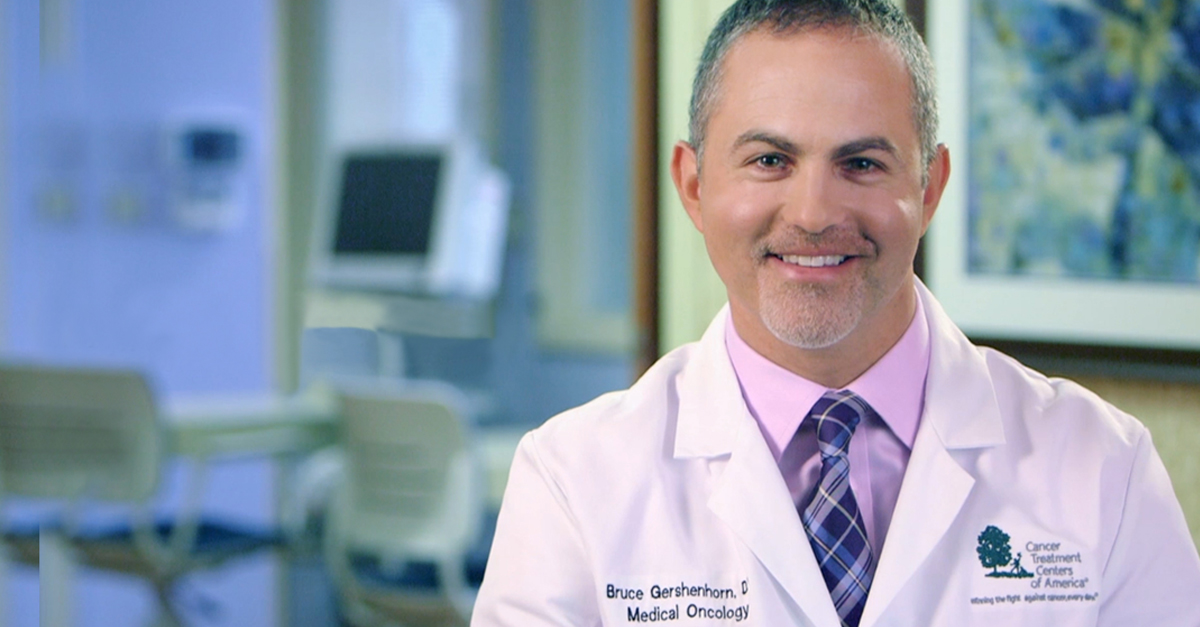
Getting a lung cancer diagnosis is a stressful, emotional experience that can come with a litany of questions and worries, like:
- What’s my prognosis?
- What type of lung cancer do I have?
- What stage is it?
- What doctor should I see?
- What’s my treatment going to be like?
- Am I going to have to take time off work or lose my job?
If this is you, or if you’ve recently been diagnosed with lung cancer, you may think it’s too soon to get a second opinion. Or, maybe you fear you don’t have enough time to get one. Patients are often afraid their cancer will spread if they don’t start treatment right away. Usually—not always—there’s time for a second opinion at this point.
A recent diagnosis isn’t the only appropriate time to get a second opinion, however. There are valid reasons to seek one after you’ve been in treatment a while. Perhaps your cancer isn’t responding to your current treatment, and you’re wondering whether other treatment options are available. Or maybe you’re unhappy with your current cancer care for some reason, and you’re considering changing doctors.
Despite having legitimate reasons to get a second opinion, many patients are reluctant to seek one. They’re often afraid of offending their current doctor or of undermining their doctor’s authority. Rest assured that getting a second opinion is a common practice. Doctors are respectful of a patient’s wish to seek out more information, and they’ll usually assist you with the process by providing a referral, if one is needed, along with your medical records. They may even recommend a lung cancer expert for you to see.
To help you determine whether you should get a second opinion for lung cancer, this article will examine:
- Lung cancer treatment options
- When to get a second opinion for lung cancer
- Where to go for a second opinion
- Questions to ask when you get a second opinion for lung cancer
Treatment for lung cancer is changing rapidly. Cancer research has led to new therapies, such as targeted therapy and immunotherapy, that have changed the outcome for some lung cancer patients. Those who are candidates for these treatments and whose cancer responds may live for years beyond what was previously possible. Get all the information you can about your specific situation so you’re comfortable with your cancer care and treatment plan.
If you've been diagnosed with lung cancer and are interested in getting a second opinion, call us or chat online with a member of our team to schedule an appointment.
Lung cancer treatment options
Treatment options for lung cancer vary according to the type, stage, aggressiveness of the cancer and whether the cancer cells have certain genomic mutations. The most commonly available treatment options include:
Lung cancer treatment options by stage
Generally, patients diagnosed with stage 1 or 2 lung cancer are treated with surgery to remove a lobe of the lung (a lobectomy) or with stereotactic body radiation therapy (SBRT). This treatment is sometimes followed by chemotherapy.
Surgery isn’t usually an option for patients with stage 3 lung cancer because the cancer has spread to the lymph nodes and/or nearby areas. Treatment may consist of chemotherapy and radiation, followed by a year of immunotherapy.
Learn more about stage 3 cancer.
Treatment options for stage 4 lung cancer may include targeted therapy, chemotherapy and/or immunotherapy, sometimes in various combinations. Chemotherapy and immunotherapy may be used together; however, in certain circumstances, immunotherapy may be used alone. When it’s an option, targeted therapy is not usually combined with another type of treatment.
Targeted therapy for lung cancer
Not everyone is a candidate for targeted therapy. This type of precision medicine may be an option for you if your cancer cells have certain features or genomic alterations that have been shown to respond to them. Advanced genomic testing may identify these features.
Targeted therapy drugs are like smart-bomb drugs for cancer. They’re designed to directly identify and attack the features on cancer cells that are causing the cancer to multiply and spread. Patients may experience fewer treatment side effects with this therapy because it’s designed to bypass healthy cells. To date, the U.S. Food and Drug Administration has approved over 20 targeted therapies for lung cancer.
Immunotherapy for lung cancer
The body’s immune system doesn’t always recognize cancer cells as a threat because these cells mutate from healthy cells and sometimes have other ways of thwarting the immune system. Immunotherapy is designed to get the immune system to recognize and attack cancer cells.
These immune-stimulating therapies have been among the biggest game changers in oncology over the past 20 to 40 years. The immune system is able to kill cancer cells once it recognizes them as a threat. When immune therapies teach the immune system to combat cancer cells, we’re sometimes able to control a patient’s cancer for years.
When should you get a second opinion for lung cancer?
As a patient, you have a right to get a second opinion for any reason, at any time, period. When it comes to fighting lung cancer, compelling reasons to consider getting a second opinion include:
Genomic testing hasn’t been performed. If genomic test results reveal a genetic mutation or some other alteration that can be targeted with a drug, this opens up the possibility of targeted therapy. This may be done as part of a clinical trial. If genomic testing was attempted on an insufficient amount of biopsy tissue, a liquid biopsy may be an alternative. If you’re a candidate, these treatments may significantly affect your quality of life and long-term prognosis; you want to know if they’re an option for you.
You started treatment, but you aren’t happy with some aspect of your care. Some patients aren’t happy with their current treatment options or with the side effects of treatment they’re experiencing. Others aren’t satisfied with the relationship they have with their doctor or their doctor’s staff. They might feel rushed during appointments or don’t feel like their questions and/or concerns are being answered. It’s important to have confidence in your cancer care team and your treatment options. In addition to seeking additional treatment options, a second opinion may be a way to investigate the possibility of transferring your care to a new care team.
You’re interested in clinical trials. Clinical trials may be an option if you have advanced cancer or if your cancer isn’t responding to treatment. If you qualify, a clinical trial may be a way to try a promising treatment option that’s not yet approved for your specific cancer type. City of Hope is one of the largest U.S. contributors to the Targeted Agent and Profiling Utilization Registration (TAPUR) study The study's aim is to improve our understanding of how commercially available anti-cancer drugs perform on a broader range of cancers, by matching the drugs to tumors with specific genomic mutations that the drugs are designed to target.
You’re seeking peace of mind. No matter where you are in your cancer journey, an independent confirmation of your diagnosis and treatment plan may provide peace of mind; that’s reason enough to warrant a second opinion. Having experts in your type of lung cancer look at your case may also result in treatment recommendations your doctor may not have previously considered.
Where should you go for a second opinion?

Whether you’re looking for a doctor or facility to begin treatment for lung cancer or to get a second opinion, trying to narrow down where to go can feel overwhelming. Your health insurance company may provide a list of in-network doctors or facilities, but choosing randomly from a list for such an important decision isn’t ideal. Your primary care physician may recommend a trusted colleague or a respected medical center. Patients often reach out to family members or friends who’ve had a cancer diagnosis for recommendations. Others search online for “best treatment centers for lung cancer” or something similar.
Personal recommendations are valuable, but it’s important to have multidisciplinary experts who know the ins and outs of lung cancer look at your case and discuss their findings with one another to determine an appropriate course of action for you. This team includes pathologists, radiation oncologists, interventional pulmonologists, medical oncologists and thoracic surgeons who have access to state-of-the-art diagnostic resources, advanced treatment options and clinical trials. You’re most likely to find these experts and resources at a larger hospital or cancer center.
The patient experience at some high-profile, high-volume hospitals may sometimes seem impersonal. These centers may be an excellent place to get a second opinion but not a warm place to spend your treatment time. This isn’t important to everyone, but if you’re considering transferring your cancer care, pay attention to your interactions with the doctors and the care team. Ask yourself questions like:
- How comfortable am I with this center and this doctor?
- Do I feel like they're going to spend the time with me that I need?
- Do I feel like they’ve got my best interest in mind?
- Are all of my questions and concerns being addressed?
City of Hope threads the balance between research and community oncology. Our cancer experts provide access to advanced, comprehensive treatment options to fight the disease and supportive care therapies to help patients manage side effects of treatment—while treating our patients with the compassion, dignity and respect they deserve.
What questions should you ask while getting a second opinion for lung cancer?

It’s important to get your questions answered during your appointment. It may be helpful to bring someone with you to take notes. Information sometimes becomes too much for a patient to take in at one time.
You can find prepared, comprehensive lists of questions on reputable nonprofit cancer websites, such as the one available from the National Cancer Institute. But I believe the most important questions patients with lung cancer should ask include:
- What type of cancer is it? Is it non-small cell lung cancer or small cell lung cancer?
- What stage is it?
- Is it curable?
- Am I a candidate for immunotherapy? If not, why not?
- Am I a candidate for a targeted therapy? If not, why not?
My personal recommendation is to gingerly address issues about prognosis, at least in the beginning. Any estimate of an answer to “How much time do I have?” can be inaccurate. Your outcome depends on how the treatment you’re on is working. In some cases, if you have a targeted mutation and you’re on a drug that’s working, it could work for years. Of course, if you really want to ask the question, ask it. But know that sometimes, there’s no way to know the true answer.
So, should you seek a second opinion for lung cancer? That’s up to you. A second opinion may provide you with more information about your disease, empowering you to make more confident decisions about your care. In some cases, it may lead you to a new treatment option or an alternate plan of care that has the potential of a better outcome and/or quality of life.
On the other hand, it may provide confirmation that you and your doctor are going in the right direction, giving you valuable peace of mind. The decision is ultimately yours.
If you’re interested in getting a second opinion for lung cancer, or if you’d just like to talk with someone about your treatment options, call us or chat online with a member of our team to schedule an appointment.


